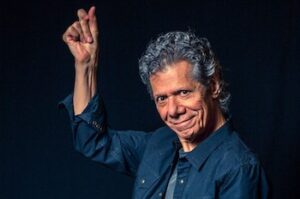
Chick Corea
*Chick Corea was born on this date in 1941. He was a white-Italian-American jazz composer, keyboardist, bandleader, and occasional percussionist.
Armando Anthony Corea was born in Chelsea, Massachusetts, to parents Armando J. Correa and Anna Corea. He was of southern Italian descent, and his father was born to an immigrant from Catanzaro, Calabria. His father, a jazz trumpeter who led a Dixieland band in Boston during the 1930s and 1940s, introduced him to the piano at the age of four. Surrounded by jazz, he was influenced early by Bebop and Dizzy Gillespie, Charlie Parker, Bud Powell, Horace Silver, and Lester Young.
When he was eight, he took up the drums, which influenced his use of the piano as a percussion instrument. Corea developed his piano skills by exploring music on his own. A notable influence was concert pianist Salvatore Sullo, from whom Corea began taking lessons at the age of eight, and who introduced him to classical music, sparking his interest in musical composition. He also spent several years as a performer and soloist for the St. Rose Scarlet Lancers, a drum and bugle corps based in Chelsea. Given a tuxedo by his father, he started playing publicly while in high school. He enjoyed listening to Herb Pomeroy's band at the time, which had a trio that played Horace Silver's music at a local jazz club. He moved to New York City, where he studied music education for one month at Columbia University and six months at the Juilliard School. He quit after finding both disappointing.
Corea began his professional career in the early 1960s with Mongo Santamaria, Willie Bobo, Blue Mitchell, Herbie Mann, and Stan Getz. He released his debut album, Tones for Joan's Bones, in 1966. He released a trio album, Now He Sings, Now He Sobs, with Roy Haynes and Miroslav Vitous two years later. In 1968, he read Dianetics by author L. Ron Hubbard and became interested in Hubbard's science fiction novels in the early 1970s. Corea said that Scientology profoundly influenced his musical direction in the early 1970s. In live performance, he frequently processed the output of his electric piano with a ring modulator. He appeared on multiple Miles Davis albums, including Black Beauty: Live at the Fillmore West and Miles Davis at Fillmore: Live at the Fillmore East.
His live performances with the Davis band continued into 1970; the final touring band he participated in consisted of saxophonist Steve Grossman, electric organist Keith Jarrett, bassist Dave Holland, percussionist Airto Moreira, drummer Jack DeJohnette, and, of course, Davis on trumpet. Holland and Corea departed the Davis band simultaneously to form their free jazz group, Circle. This band was active from 1970 to 1971 and recorded on Blue Note and ECM.
In 1971, Corea decided to work solo, recording the sessions that became Piano Improvisations Vol. 1 and Piano Improvisations Vol. 2 for ECM in April of that year. Communication with an audience became a big thing for him at the time. He used that concept so much at that point in his life – in 1968, 1969, or so – because it was a discovery for him. I grew up thinking how much fun it was to tinkle on the piano and not noticing that what I did affected others. He did not even think about a relationship with an audience until later.
Named after their eponymous 1972 album, Corea's Return to Forever band drew on both acoustic and electronic instrumentation, initially relying more on Latin American music styles than on rock music. On their first two records, Return to Forever consisted of Flora Purim on vocals and percussion, Joe Farrell on flute and soprano saxophone, Airto Moreira on drums and percussion, and Stanley Clarke on acoustic double bass. Drummer Lenny White and guitarist Bill Connors later joined. The intersectionality of the group recorded the album Hymn of the Seventh Galaxy before Connors' replacement by Al Di Meola, who was present on the subsequent Where Have I Known You Before, No Mystery, and Romantic Warrior. Corea married vocalist/pianist Gayle Moran in 1972.
In 1976, Corea issued My Spanish Heart, influenced by Latin American music and featuring vocalist Gayle Moran and electric violinist Jean-Luc Ponty. However, Corea was excluded from a concert during the 1993 World Championships in Athletics in Stuttgart, Germany. The concert's organizers excluded Corea after the state government announced it would review its subsidies for events featuring avowed members of Scientology.
After Corea complained about this policy to the administrative court in 1996, which was unsuccessful, the United States Congress decried a violation of its human rights in a letter to the German government. However, Corea was not banned from performing in Germany and had several appearances at the government-supported International Jazz Festival in Burghausen, where he was awarded a plaque in Burghausen's "Street of Fame" in 2011. Chick Corea, who won 23 Grammy Awards and was nominated over 60 times, died on February 9, 2021.